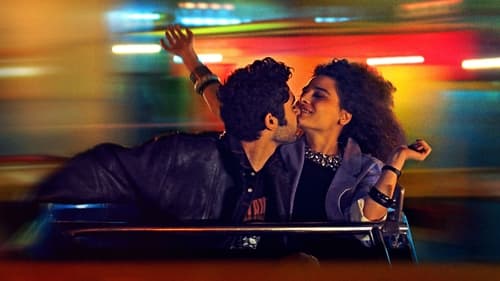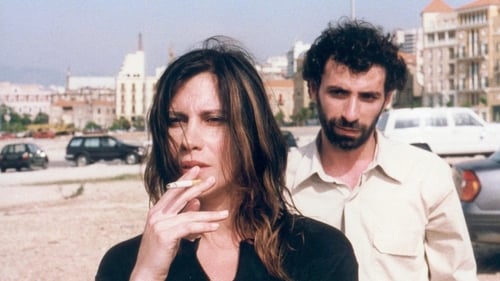
Raja
Maia, a single mother, lives in Montreal with her teenage daughter, Alex. On Christmas Eve, they receive an unexpected delivery: notebooks, tapes, and photos Maia sent to her best friend from 1980’s Beirut. Maia refuses to open the box or confront its memories, but Alex secretly begins diving into it. Between fantasy and reality, Alex enters the world of her mother’s tumultuous, passionate adolescence during the Lebanese civil war, unlocking mysteries of a hidden past.

Director

Director
Syria, 2011. In the streets, right in front of the eyes of the entire world, men are shot down and film their own deaths. Images of a revolution. Revolution of the image. A captivating theatrical lecture.

Syria, 2011. In the streets, right in front of the eyes of the entire world, men are shot down and film their own deaths. Images of a revolution. Revolution of the image. A captivating theatrical lecture.

Writer
It's Independence Day in Lebanon: three women who've never met before are on the same bus heading to visit a prison situated in a remote area of the country. Traveling through an arid landscape littered with mines and decapitated dreams, the journey transforms into the women's quest for their own independence.

Himself
July 2006. Another war breaks out in Lebanon. The directors decide to follow a movie star, Catherine Deneuve and a friend, actor and artist Rabih Mroue;, on the roads of South Lebanon. Together, they will drive through the regions devastated by the conflict. It is the beginning of an unpredictable, unexpected adventure...

Following on from the 2006 Israeli aggression on Lebanon, the filmmaker tries to film the destruction of Beirut. We witness a city deserted by life, and ghostly characters who, featured in his earlier films, talk about living through such a war.

Director
This is followed by Mroué’s video With Soul With Blood (2003-2006), in which the artist ruminates about being part of a crowd while struggling to remain an individual during one of the demonstrations following the still-unsolved 2005 assassination of former Lebanese prime minister Rafik Hariri. Hariri’s car-bomb killing lead to huge pro- and anti-Syria rallies in Beirut, which triggered the fall of the government and the withdrawal of the Syrian military. Today, the civil war in Syria has spilled over to Lebanon, and there is a massive influx of Syrian refugees in the country, making up nearly one seventh of the population.

Director
This film originated from a multi-media performance called Three Posters, conceived and staged by Mroué and the Lebanese novelist Elias Khoury, and first performed in Beirut in 2000. The performance centred on an unedited tape made by Jamal al-Sati, a fighter for Lebanon’s National Resistance Front. This shows three ‘takes’ of his martyr testimony rather than the approved version that was aired on Lebanese television. The three ‘takes’ allowed Mroué and Khoury to question the status of suicide videos and martyr posters, and to examine the ideological circumstances surrounding their production and place within the visual culture and political history of Lebanon.

Writer
Nabil returns to Beirut with the ashes of his father who died abroad. He tries to overcome his bereavement while his family insists on respecting rites and customs by burying a non-existent corpse.

Nabil
Nabil returns to Beirut with the ashes of his father who died abroad. He tries to overcome his bereavement while his family insists on respecting rites and customs by burying a non-existent corpse.

Nabil returns to Beirut with the ashes of his father who died abroad. He tries to overcome his bereavement while his family insists on respecting rites and customs by burying a non-existent corpse.

Tarek
In Beirut, the destinies of several thirtysomethings (an architect, a tour guide, a mystic, a radio operator, and an exile returned home) collide.

Director
Face A / Face B is an autobiographical journey spanning from the artist’s childhood to the present, in the context of the Lebanese civil war. The video includes photographs, voice, melodies and historical data, in a story that explores aspects such as the nature of memory, the human voice and identity. Through a cassette tape that he and his brother recorded to send to a third brother who was living in Russia, the work questions the meaning of the past and shows that collective and personal histories are inseparable and intertwined. Private and collective memories mingle in a collection of voices that bring together personal memory, political critique and philosophical reflection.

‘Objects of War’ is a series of testimonials on the Lebanese war. Each person chooses an object, ordinary or unusual, which serves as a starting point for his / her story. These testimonials while helping to create a collective memory, also show the impossibility of telling a single History of this war. Only fragments of this History are recounted here, held as truth by those expressing them. In ‘Objects of War’, the aim is not to reveal a truth but rather to gather and confront many diverse versions and discourses on the subject. ‘Objects of War’ started in 1999 assembling the testimonials of eleven persons. It was first shown in 2000 . It continued in 2003 with ‘Objects of War n°2’, recording seven additional testimonials. This time however, and since then, the recorded material is left unedited, shown in its integrity. The work of collecting and assembling these stories continued with ‘Objects of War n°3 & n°4’ in 2006 and ‘n°5 & 6’ in 2014.

Late in the 1980s it seems like the Lebanese conflict will never end. Khalil returns to Beirut after many years. Ten years earlier, during a battle, he took advantage of the confusion and pretended he was dead.

Rounds is a video featuring Rabih Mroué, filmed steering through the streets of the city. Beirut is mentioned, evoked through the driver’s stories and through sound, but never seen, invisible in overexposed whiteness. However, the presence of Beirut is confirmed through the ongoing discourse. Like his driving, Mroué’s stories spin in a circle. He is like a ghost, haunting the streets of a city where a reconstruction project is in progress in a strange postwar period.















